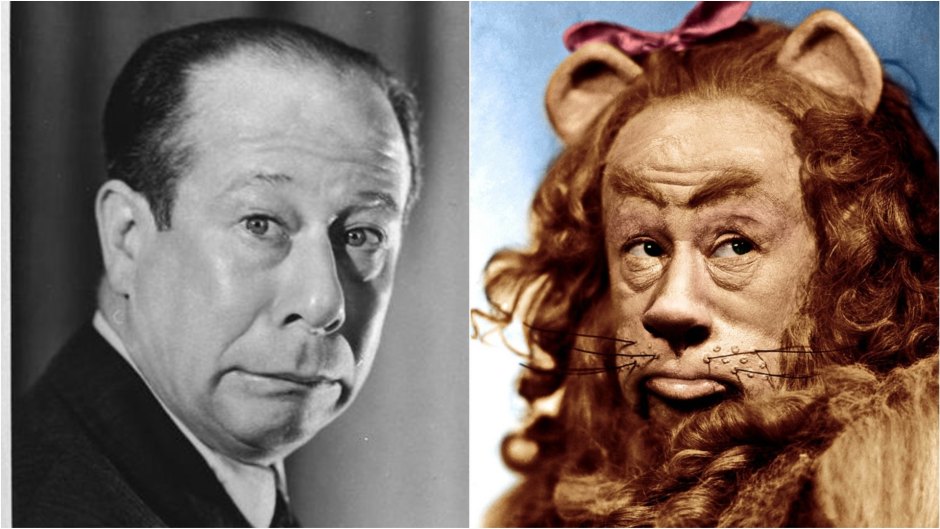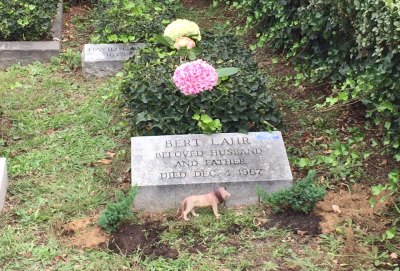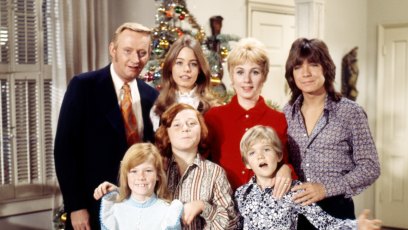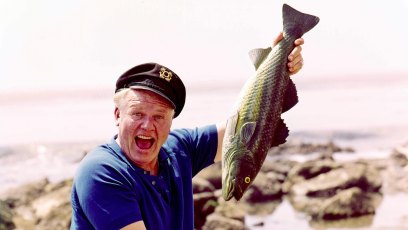
Shutterstock
Her Father, The Cowardly Lion: Bert Lahr’s Daughter Shares Her Memories of ‘The Wizard of Oz’ Star
When she thinks of the enduring memory of her father, Bert Lahr, and the way it intertwines with his most famous role as the Cowardly Lion in The Wizard of Oz, Jane Lahr finds herself remembering the day she and brother John visited their father’s gravesite at Union Field Cemetery in Ridgewood, New York for the first time since his death in 1967.
“His gravesite is supposed to have perpetual care,” Jane says in an exclusive interview. “Well, I don’t know what they mean by perpetual care, but as we got there we saw there wasn’t a lot of it being done. But on his stone, a child had left a toy lion, and that speaks to me of Dad. We fixed up the gravesite, I planted a plant and we moved the little toy lion right up front and left everything in good shape. But that’s when I really think of Dad; the thought of that child leaving that lion. I can see a mother with a little boy, saying, ‘Oh, this is the lion in The Wizard of Oz’ and the toy is left in tribute. It’s so sweet.

“My father,” she continues, “would never watch his own movie work, because he didn’t really like his movies except for Zaza. When The Wizard of Oz came to TV, he never watched it until very close to the end of his life. I was home from college and it came on television and he watched it. And he thought, ‘Hmm, that’s okay. That was good.’ He was a great stage performer, because of his energy and his physicality and his sounds. He was a perfect Lion, because even when he was a vaudevillian, he made these animal sounds. He had all of the body movements, all of the power, all of the physicality, but he also had a sweetness and a pathos — a vulnerability that we all, as human beings, understand. We love that and so, in a way, at the end of the movie, when Judy Garland kisses Ray Bolger, the Scarecrow, and says, ‘I’m going to miss you most of all,’ I always thought, ‘Oh, you are not. You’re going to miss the Lion most of all, because he was the most adorable.’”
Shucks, folks, he’d be speechless.
For much more on Jane and Bert Lahr, please scroll down.
1 of 27

NY Public Library of the Performing Arts
Although there was so much more to him than that one role, there’s no question that the Cowardly Lion serves as the perfect embodiment of many of Bert’s comic gifts and the public persona he presented. Which, as is frequently the case with comics, served as somewhat of a contradiction to who he was in private. That was something that Jane had to consider when this request to speak to her about him first came in.
2 of 27
![DSCF0582 copy 2[1][1]](https://www.closerweekly.com/wp-content/uploads/2020/06/DSCF0582-copy-211.jpg?fit=800%2C1067&quality=86&strip=all)
Courtesy Jane Lahr
“I was joking with a friend,” she explains, “because when I mentioned we were going to talk about Dad, I said, ‘What am I going to tell him? I had 12 conversations with him my whole life.’” That comment hangs in the air a brief moment before Jane adds, “We had a lovely relationship, but I developed an intuitive sense, because he was a man of so few words. You had to pay attention and read him, but there was that sweetness there and I could make him laugh. I’ve always felt admired by Dad. He never knew what schools John and I were in or anything; he really lived in another world. He was a big worrier and I’d say he was a classic clown. He was a very serious, sweet hermit who didn’t talk too much. But he did have great instincts and taste and was a reader, despite the fact he had no real education. He would do the New York Times crossword puzzle every week and would read Dickens.”
Continuing to paint that portrait of him, Jane notes that she had begun to sculpt when she was in high school and she ended up having a one-woman show. “He wasn’t at all interested in our school life or anything, but he came to see my show. At the time, that was everything,” she says warmly.
3 of 27

Courtesy Jane Lahr
One point Jane emphasizes is that when he said something, you usually needed to pay attention to it. “When I was just becoming a teenager,” she recalls, “and flirting with guys, I was on the phone once and Dad overheard me. I was basically jerking these guys around and not treating them respectfully. He came into the room and said, ‘In my neighborhood, if you behaved that way, you’d end up in the East River with your feet in cement.’ Do you think I ever did that again in my life with anybody? But the thing is, he wasn’t tough. Again, there was a sweetness there. When I was a teenager I blared music in my room. Then, when I went away to college, he would go in my room and put on my records. But he couldn’t say I love you. John and I, between us, received two letters from him our whole life. But I knew he loved me. The very fact that Mom said he was going in my room and playing my records said everything.
“I went to the Slade School of Fine Art in London,” Jane elaborates, “and he drove my best friend, my brother, my mother and myself to the airport and he cried all the way there — we were all afraid for our lives. Then my friend afterwards called me and said, ‘He cried all the way home, too.’ So he didn’t have to say I love you.”
4 of 27

Playbill
Her father was born Irving Lahrheim on August 13, 1895 in New York City, the son of German Jewish immigrants. Describes Jane, “There wasn’t any money, really, but these were good folk. He hated school and wouldn’t sleep alone in a room, it frightened him. Then he ended up going out on the streets of New York and having friends that might not have been appropriate. When he was in school, he would perform and he had a teacher who said to him, ‘Bert, you’re just going to end up in jail. Or on the stage.’”
Obviously it was the latter.
5 of 27

Mgm/Kobal/Shutterstock
On July 30, 1939, the New York, Daily News chronicled his background by detailing, “He went to school in the Bronx, but was bitten by the stage bug when he was still a kid. He and some of his neighborhood friends, including Frank Munn, radio and musical comedy singer, organized a vaudeville act which Lahr coached and with the seven youngsters selected from the group, developed into the Seven Frolics. The kids actually got a few weeks work and it was the beginning of a career on the stage for Lahr.”
6 of 27

MGM
The same publication, in December of that year, filled in a bit more on his personal history: “Bert Lahr was trouping in burlesque for 10 years trying to get a break … One day at the Friars, Harry Delmar decided to produce a revue. He had worked on bills with Lahr and knew how funny Lahr was. Lahr went into Delmar’s Revels believing it to be his big chance. There was another opening the night Revels opened at the Shubert Theatre. The first string critics didn’t see Lahr. The show was a flop. Opportunity had knocked for Bert Lahr, but it was a hard knock. His chance had come and gone. He had had hopes. However, one of the few people who saw Delmar’s Revels was a musical comedy producer. He got a laugh out of Lahr. He needed a laugh for his forthcoming show. So when Bert was getting ready to say quits, he was signed to play in his first Broadway hit, Hold Everything. The unexpected always happens.”
7 of 27

Moviestore/Shutterstock
Part of the draw of acting, as Bert relayed to the Hanford Morning Journal in 1942, had to do with an inability to hold a job. “Life was just one dismissal slip after another until I got into acting,” he said. “It was mainly because I couldn’t keep my mind on my work. I was bitten by the theatrical bug when I was in my cradle. I guess because I never wanted to do anything else as far back as I can remember. I used to write plays while I sat at my desk as an office boy. I would get so interested, I wouldn’t hear the buzzer when the boss rang and I’d be fired pronto. As a truck driver, I couldn’t keep my mind on my work and I think I quit just in time to keep from absent-mindedly wrecking the machine.”
8 of 27

Playbill
Hearing what Jane has to say about him, the dichotomy between Bert on stage and in his personal life was striking, going from the outrageous to the introverted. “When he performed,” she reflects, “it wasn’t an ego thing. He just really loved the audience and they loved him. And he gave something to the audience, because people would literally fall out of their seats laughing. Once I was at a dinner party [thrown by] Burton Lane, who wrote On a Clear Day, You Can See Forever. Zero Mostel was there and Zero ate up every bit of oxygen in the room. He was a brilliant performer, but I remember thinking, ‘Oh my God, what if I grew up in a household like that? I would have suffocated.’ I think by his absence — the beneficiary absence of my father — he allowed both my brother and myself to grow up and have our own space, to have our own thoughts. There was no suppression. Yes, he was depressed and that was there, but he wasn’t eating up all the oxygen in the room. We could grow in that space. My mother believed in education and we were well-educated. If we had just been in my father’s household — without Mildred — ho knows what we would have become.
“Dad was born in 1895,” Jane points out, “and the sensibility of someone born in 1895 is very different from someone born after there’s been therapy and psychology.”
9 of 27

NY Public Library of the Performing Arts
Bert himself related to the Times Union of Brooklyn on February 23, 1936, “I die a thousand deaths before the rise of the first night curtain, whether the first night happens to be in Richmond, Newark or Boston. Nobody with any degree of assurance can predict what will or will not be funny in a new show. I have heard actors in rehearsal laugh at scenes that died aborning across the footlights. On the other hand, sketches or pieces of business that nobody paid any attention to emerged the most hilarious when served to audiences. It is this uncertainty that crushes a comedian and positively wears him out during the period of rehearsals.”
10 of 27

Courtesy Jane Lahr
He became a Broadway comic sensation, his many credits including Hold Everything (1928 to 1929), Flying High (1930 to 1931), Hot-Cha! (1932), George White’s Music Hall Varieties (1932), Life Begins at 8:40 (1934 to 1935), George White’s Scandals (1935 to 1936), The Show is On (1936 to 1937), Du Barry Was a Lady (1939 to 1940, which saw him co-starring with Ethel Merman, humorously flashing him a message in the image above), Seven Lively Arts (1944 to 1945), Burlesque (1946 to 1948) and Two on the Aisle (1951 to 1952). In between all of that, he began to appear in feature films. “Once you reach the big time, then Hollywood pillaged the Broadway talent,” says Jane. “Now it’s the other way around, with Broadway pillaging movie talent as performers.”
11 of 27

Moviestore/Shutterstock
His early movie credits, besides appearing in a number of shorts between 1929 and 1937, count among them Flying High (1931), Merry Go Round of 1938 (1938), Love and Hisses (1937), Josette (1938), Just Around the Corner (1938) and Zaza (1939). The same year as the latter, of course, he brought the Cowardly Lion to life in The Wizard of Oz, the impact of which is obvious to Jane on a number of levels. For starters, there’s the fiscal side of things insofar as her family was concerned. “You have to remember that when they made the movie, they gathered the very best talent in Hollywood at that moment, but my dad and the others were basically middle-aged vaudevillians. Judy Garland was part of the MGM studio plan and she and Toto made the least making the movie. She was paid $500 a week and Toto made $125 a week. They offered dad three weeks at $2,500, but he insisted on five and it ended up taking 24. In today’s money, he made a million dollars. They all made small fortunes from it.”
12 of 27

Mgm/Kobal/Shutterstock
She relays an interesting story of how her father got involved with the film in the first place. “Noel Langley, who was an English children’s book writer and a very interesting guy, wrote the script for The Wizard of Oz and his first draft had a prince in it. When the prince became a lion, lyricist Edgar ‘Yip’ Harburg said, ‘Hey, I think we know the person who should be the lion’ because of dad’s physical power, his physicality and the noises he makes. He was right and then Yip wrote for him his song in the movie, ‘If I Were King of the Forest,’ and he knew exactly how to write it and there it was. But it wasn’t until the fourth version of the rewrite that the Lion appeared.
“The other thing that’s really interesting about him and this movie,” she adds, “is Frank Morgan [who played the Wizard] during the movie said, ‘Bert, you and Judy are going to get all the reviews, but it’s not going to do anything for your careers.’ Dad said, ‘But why?’ and he said, ‘Because there aren’t that many lion parts in Hollywood.’ Within a year of the movie being made — and, indeed, Judy and Dad got all the reviews — they dropped his contract.”
13 of 27

Mgm/Kobal/Shutterstock
The Wizard of Oz, of course, has endured for over 80 years. As to why, Jane suggests, “When it was released, we were on the cusp of getting into a major world war, and if you ever noticed the Witch’s minions in the movie, the flying monkeys, they remind you of the German planes that were bombing London. And her soldiers, the Winkies they march like Russians or Nazis. All of a sudden we’re in this land where this darkness is prevalent, like in other movies of the time (even Snow White and the Seven Dwarves). Now I was five when I first saw The Wizard of Oz; I wasn’t alive when it was made. My brother and I went to a screening in New York and there’s a photograph of me in horror with my mouth open and my brother in front of me in the aisle seat, just stunned. That aspect of the movie remained so powerful and allowed it to live on.”
14 of 27

Mgm/Kobal/Shutterstock
“It came through even then, and this was after the war,” she continues. “And I think it’s cycling around again to a moment where we see fascism on the planet and danger on the planet. I think it’s a very positive film for us to be conscious of right now, because the movie is a waking dream. In the outcome, the Witch is dead, Dorothy gets back to Kansas and it has a positive ending. In the movie, the Wizard’s really a nice guy, a lovely guy who’s a terrible wizard. But sometimes it feels like the ‘Wizard’ is not a nice guy and America doesn’t want a Wicked Witch of the West, making the film more important than ever.”
15 of 27

Mgm/Kobal/Shutterstock
After The Wizard of Oz, Bert made only a limited number of films: Sing Your Worries Away (1942), Ship Ahoy (1942), Meet the People (1944), Always Leave Them Laughing (1949), Mister Universe (1951), Rose Marie (1954) and The Second Greatest Sex (1955). In 1956, he was back on Broadway in Waiting for Godot, which represented a very different kind of performance for him. Bert noted to the Elmira Advertiser, “Waiting for Godot is the play that pleased, infuriated and confused in varying proportions. It was controversial. Those that hated it, spit at it. Yet it had its cult and it created a different type of audience for me. It was like playing Carnegie Hall; it changed my whole career. Before that, I was a buffoon. This gave me a chance to play Shaw and Moliere.”
16 of 27

Playbill
That same year he starred on stage in Hotel Paradiso, of which he admitted to the Democrat and Chronicle, “This is the most difficult role I’ve ever tried. Farce is the toughest form of humor there is — and this is the first full-length farce I’ve ever done. You gotta be utterly sincere in a contrived situation. If this was vaudeville or musical comedy, I could fool around and let the audience in on a lot of little things. But you can’t do that in farce where everything depends on rhythm and speed. It’s just like ballet.”
17 of 27

NY Public Library of the Performing Arts
“Waiting for Godot was strenuous, too,” he continued. “But in a different way. I don’t get any particular kick out of doing one kind of show or another. Any successful thing is gratifying — naturally you don’t want flops. You hear a lot about actors always wanting to change the type of parts they play. I don’t mind the same kind of role in succession — but change is all right, too. Also, you hear a lot about actors sensing audiences and having stage fright. I’ve never been bothered about audience reaction. If they don’t laugh, it doesn’t necessarily mean they’re not enjoying themselves. Maybe they just like to be quiet. And stage fright never bothered me. You have to be horribly insecure to have stage fright.”
His subsequent stage shows were The Girls Against the Boys (1959), The Beauty Part (1962 to 1963) and Foxy (1964, for which he won the Tony Award as Best Actor in a Musical).
18 of 27

Playbill
Reflects Jane, “He loved Broadway. Movies were not his greatest love and he didn’t believe he was a perfect candidate for them. His presentation was too big for the screen, it was too hot and too out there. I do think he was right. I think the Lion and a few other movies were fine for him, but he could never be a leading man. He could do character parts or be the sidekick. He wanted to be the star, so he came back to Broadway and he was the star. And there he could feed off the energy of the audience.”
19 of 27

United Artists
But stardom was changing, something that Bert acknowledged to the Star-Gazette in 1962, pointing out, “It doesn’t bother me that I’m the only one of the old bunch left on Broadway, but it is a little frightening to be all that’s left of a nearly vanished art. Years ago, if you wanted to be anybody, you had to be an original. Now everyone is eager to follow along and imitate someone else. At this point in my career, I want to develop all my alleged talents as much as possible. I’ve turned down only one thing, really — a great role, but very abstract and the subject matter was distasteful. How satisfied have I been with this variety? To the extent that I found I could do such a thing. I have a reputation as a clown, a low comedian. Well, that type of performer has sort of faded out with changing public taste. That began with Oklahoma!, when the play really became the thing. It’s harder to make people laugh nowadays. Human nature doesn’t change, but audiences have become more selective due to the saturation they get in TV and movies.”
20 of 27

Courtesy RetroVision Collection
Bert did some television, but wasn’t comfortable in the medium and avoided the road that many big screen and stage performers took by starring in their own show. “It’s not just the work involved in doing a show once a week or once a month, although goodness knows it’s hard enough,” he stated to The Sacramento Bee in 1954. “But you wear out your welcome that way, especially a comic does. Why, just take myself as a viewer, for example. There are a lot of the best performers that I love and admire very much. But, and this is nothing against them or their work, if I get to see them too often on television, I lose interest. It’s bound to happen to anyone. The frequency and intimacy of TV can be murderous to a performer.”
21 of 27

United Artists/Kobal/Shutterstock
In 1967, Bert was filming Norman Lear’s film The Night They Raided Minsky’s when he grew seriously ill, dying on December 4 of that year, reportedly of pneumonia. In truth, though, it turns out that he had been unknowingly dying of cancer, a disease he desperately feared.
“He was a very hard worker,” observes Jane, “and he had an extraordinary career that spanned every medium at the time. When he died making The Night They Raided Minsky’s, he had also been doing the Lay’s Potato Chips TV commercials, which were the best commercials ever done for Lay’s. All in all, it was an interesting career that went from vaudeville to doing television commercials, and he was one of the first to ever do that. He actually died feeling good about his journey.”
22 of 27

Courtesy Jane Lahr
Bert Lahr’s personal life was a complicated one. In 1917, while being part of an event called the “Columbia Wheel Review,” he was reunited with dancer Mercedes Delpino, who he’d met a year earlier. They became a team both professionally and personally, and were married in 1929 (having a son, Herbert, that same year). But Mercedes suffered from a number of mental issues, among them depression and schizophrenia, which Bert seemed oblivious to. As noted in Vaudeville Old & New, “Bert was so busy trying to break through from vaudeville to Broadway musicals and revues, that he failed to notice her distress; he saw only that she had become increasingly withdrawn.” The marriage splintered apart and Bert fell in love with Mildred Schroeder, but because he was having trouble getting a divorce — he had to convince the courts that Mercedes was “insane” (the word used at the time) — Mildred married another man. Bert did manage to win her back, though (much to the consternation of her husband), which made all the newspapers at the time (“It was a scandal,” says Jane). Bert and Mildred, after getting married, had two children, John, who was born in 1941; and, of course, Jane, who was born in 1943.
23 of 27

Courtesy Jane Lahr
Jane is an author and literary editor, and at the moment is collaborating with artist Gabe Gale and writer John Fricke on a book titled Discovering Oz. “Gabe is a young man who graduated from Cooper Union, an art school, and then went on to Columbia Architectural School. He has redrawn every character in the original L. Frank Baum books. Every creature, some of them never drawn before, and they are extraordinary. I’m an author at times, a book agent and a book packager, and I’ve never done anything having to do with Oz before, but I couldn’t resist this project. I was so blown away by this talented artist.”
24 of 27

Courtesy Jane Lahr
Her brother John, is an acclaimed London-based drama critic, writer of profiles for the New Yorker (and previously the longest standing theater critic in the history of the magazine) and author. One of his most fascinating books is Notes on a Cowardly Lion: The Biography of Bert Lahr, that features the most in depth look at Bert (and which he was extensively interviewed for) ever presented; a portrait that revealed their father (and mother) for the first time to both John and Jane.
25 of 27

Open Road Media
“There is knowing and knowing,” says Jane. “John’s Notes on a Cowardly Lion opened up Dad’s history for me. It was window into him in which to see his family and childhood. And the arc of his early life – John is a scribe who writes from his head and his heart and, yes, the details of his early days were made real. As well as the years before I was born and old enough to observe.
“But I remember as a kid at the Spence School, my friends and I would be looking in Who’s Who in America and finding out things about Dad that he had never mentioned. John’s book was also full of revelations. That said, I was very tuned in to Dad; he was a man of few words, but I stretched my mind reading abilities — and came to be good at sussing out what was behind the silences.”
26 of 27

Courtesy Jane Lahr
She continues, “I found out about Mom when I was a young parent and we would have lunch at the Plaza Hotel before it was Trumped — it was a lovely place. We became friends and she told me about her losses as a child: her father left when she was two or three, her brothers were fostered out, her sister as well and her adored younger brother died in the foster home. Mother searched for her sister and found her after we were born and living in New York. Mother was put up for adoption — I believe for Alice Roosevelt, but it did not take. Alice would have eaten Millie alive!
“Anyway, her childhood was Dickensian. But when she won a beauty contest and the car, she got in and headed for New York and waved goodbye to Cincinnati. Moved into the Century on Central Park West with another chorus girl and they had a fabulous time. She was adored by Noel Coward and she ended up in the Ziegfeld Follies, where she was a ‘pony’ —the dancers were shorter than the showgirls. She always would say that she was a favorite of Mr. Ziegfeld.”
27 of 27

Warner Bros
It’s her feeling that John’s biography captures not only her father’s voice, but what he offered the world as a clown and artist. “He brought so much to the audience, and John communicates that and the joyride of watching a great performer who was so in tune with the audience,” she closes. “Dad always gave 100%. Growing up, I assumed every performer did. Until I saw Richard Burton walk through Hamlet. Guess not! That was a eureka moment for me.”






































